As I’ve played more and more games over the years, it has come to the forefront in my mind what my favorite board game mechanic is: auctions. They come in all forms, from 15-minute fillers to three-hour headliners. Auctions may be the driving force of the entire game, while in others it may be a one-off beginning phase.
Today I’m listing my Top 10 Auction Games. Note: it is not Top 10 Games that Feature Auctions. The auctions must be a central component to the game and something that occurs regularly. By those parameters, games like Tikal (which uses auctions as a variant), and the 18xx games (which can have huge consequences resulting from the auction, but only has one in a three to six-hour experience) are left off the list.
Top 10 Auction Board Games
10. No Thanks! (review)
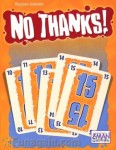 I’m late to the party with this modern classic. I picked this up, thinking that it would be a solid game to introduce to my in-laws that casually game from time to time. And I couldn’t have been more right. The game is simple: a card is flipped up, and a player can take it or use a chip to say “no thanks, I don’t want it” until one player gives in and takes it. The lowest score in No Thanks! wins, but cards in a row only score the lowest in that sequence and leftover chips are worth -1 a piece. Seems like a solvable game, until I say that nine cards are discarded out of the game during setup. That one rules quirk creates difficult decisions of pressing your luck to get the right card that can cancel a ton of points. Plus, players can make the table angry as they add chips to a card that would help them, but no one else, sucking the spending power of the others dry.
I’m late to the party with this modern classic. I picked this up, thinking that it would be a solid game to introduce to my in-laws that casually game from time to time. And I couldn’t have been more right. The game is simple: a card is flipped up, and a player can take it or use a chip to say “no thanks, I don’t want it” until one player gives in and takes it. The lowest score in No Thanks! wins, but cards in a row only score the lowest in that sequence and leftover chips are worth -1 a piece. Seems like a solvable game, until I say that nine cards are discarded out of the game during setup. That one rules quirk creates difficult decisions of pressing your luck to get the right card that can cancel a ton of points. Plus, players can make the table angry as they add chips to a card that would help them, but no one else, sucking the spending power of the others dry.
3-7 Players • Ages 8+ • 20 minutes • $10
9. High Society (review)
 This one has some sentimental value, seeing that it was my first review for Board Game Grow. But Knizia knows how to do auction games, and High Society does a lot of things right. It uses a fun card system that prevents players from making change. It has auctions for points and auctions to prevent you from taking negative events. And it has the fantastic mechanic where the person who spends the most money is automatically eliminated (because to be a part of high society, you must have possessions AND money). These combine to make a clean auction game with repercussions that can net you an automatic loss.
This one has some sentimental value, seeing that it was my first review for Board Game Grow. But Knizia knows how to do auction games, and High Society does a lot of things right. It uses a fun card system that prevents players from making change. It has auctions for points and auctions to prevent you from taking negative events. And it has the fantastic mechanic where the person who spends the most money is automatically eliminated (because to be a part of high society, you must have possessions AND money). These combine to make a clean auction game with repercussions that can net you an automatic loss.
3-5 Players • Ages 10+ • 15-30 minutes • $20
8. Fresh Fish
 A new one that I’ve gotten to play in 2021, but not a new one to some, Fresh Fish has been around in some form since 1997. Fresh Fish combines spatial recognition that you’d see in The Great Zimbabwe, The Climbers, or Sol: Last Days of a Star with a closed-fist auction (one of the lesser-seen versions in gaming). Why are the auctions in this underrated Friedemann Friese game so good? Because winning an auction with the right amount of money can be a winning move or cost you the game. It’s all about having your stands as close as possible to their respective delivery trucks (aka least points wins), and if you can score one within three spaces, you’re golden. The kicker is, like No Thanks! earlier in the list, money saved lowers your score, so every single dollar counts.
A new one that I’ve gotten to play in 2021, but not a new one to some, Fresh Fish has been around in some form since 1997. Fresh Fish combines spatial recognition that you’d see in The Great Zimbabwe, The Climbers, or Sol: Last Days of a Star with a closed-fist auction (one of the lesser-seen versions in gaming). Why are the auctions in this underrated Friedemann Friese game so good? Because winning an auction with the right amount of money can be a winning move or cost you the game. It’s all about having your stands as close as possible to their respective delivery trucks (aka least points wins), and if you can score one within three spaces, you’re golden. The kicker is, like No Thanks! earlier in the list, money saved lowers your score, so every single dollar counts.
2-5 Players • Ages 8+ • 45 minutes • Out of Print
7. The Great Zimbabwe
 Speaking of The Great Zimbabwe, here it is on the list! While a lot of the game is focused around the tile placement and drafting of powers from the gods, every round begins with an auction to determine turn order. And getting the first turn in The Great Zimbabwe is crucial. Goods printed on the board are only available once per round, so scoring more points can be impossible for those that go later in a round. It also uses a fascinating auction where your bids spread the wealth to others as opposed to going to one place, whether the bank or a single player. I rank this lower than others, even though I think it’s better than all the other games on the list, due to the auction being the lesser part of the game. But it does get bonus points for the currency being cattle.
Speaking of The Great Zimbabwe, here it is on the list! While a lot of the game is focused around the tile placement and drafting of powers from the gods, every round begins with an auction to determine turn order. And getting the first turn in The Great Zimbabwe is crucial. Goods printed on the board are only available once per round, so scoring more points can be impossible for those that go later in a round. It also uses a fascinating auction where your bids spread the wealth to others as opposed to going to one place, whether the bank or a single player. I rank this lower than others, even though I think it’s better than all the other games on the list, due to the auction being the lesser part of the game. But it does get bonus points for the currency being cattle.
2-5 Players • Ages 14+ • 90-150 minutes • $125
6. Power Grid
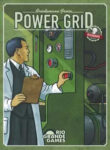 Friedemann Friese gets another appearance, and it’s what many consider his magnum opus. Power Grid is largely an auction game, where purchasing new factories can be filled with fierce competition based on the available goods to power them. The auctions are crucial to getting you closer and closer you victory, as the early factories are just too weak to get you far off the ground. It’s one of those games where money is but a tool for victory, not victory itself. The winner is the first to power a certain number of cities based on player count. It also does well for having a plethora of maps that introduce minor rules tweaks (a trait shared with the next entry).
Friedemann Friese gets another appearance, and it’s what many consider his magnum opus. Power Grid is largely an auction game, where purchasing new factories can be filled with fierce competition based on the available goods to power them. The auctions are crucial to getting you closer and closer you victory, as the early factories are just too weak to get you far off the ground. It’s one of those games where money is but a tool for victory, not victory itself. The winner is the first to power a certain number of cities based on player count. It also does well for having a plethora of maps that introduce minor rules tweaks (a trait shared with the next entry).
2-6 Players • Ages 12+ • 120 minutes • $35
5. Age of Steam
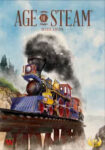 While a lot of Age of Steam focuses on the route building and delivering goods, each round opens with an auction. And the ramifications of said auctions are huge. Winners in an auction go earlier in turn order, get the first choice of actions, but have to pay full amounts. Those that bail early in the auction pay less for their bids, but are stuck choosing from the scraps. One mistake in an Age of Steam auction can lose you the game, or even bankrupt/eliminate you. Tensions run high at the beginning of each round, all due to a simple auction. Similar to Power Grid, Age of Steam has maps to differentiate play. But this game system is known for having hundreds of maps from tons of designers, all that scale for player count, introduce new mechanics, and show off new geographies.
While a lot of Age of Steam focuses on the route building and delivering goods, each round opens with an auction. And the ramifications of said auctions are huge. Winners in an auction go earlier in turn order, get the first choice of actions, but have to pay full amounts. Those that bail early in the auction pay less for their bids, but are stuck choosing from the scraps. One mistake in an Age of Steam auction can lose you the game, or even bankrupt/eliminate you. Tensions run high at the beginning of each round, all due to a simple auction. Similar to Power Grid, Age of Steam has maps to differentiate play. But this game system is known for having hundreds of maps from tons of designers, all that scale for player count, introduce new mechanics, and show off new geographies.
1-6 Players • Ages 14+ • 120 minutes • Out of Print
4. Modern Art
 Most auction games pick one manner of doing auctions. Some are once-around, others are free-form, and most are until one player remains. But what if one game has four different kinds of auctions? That is what Modern Art seeks to do, while including commodity speculation. The blend of auction types makes it not only thinky for placing bids and setting prices, but fun to mix up the pacing of the game through the various types of bidding. There are 25 different versions of the game (I own the pocket-sized Oink version whereas Andrew would recommend the DiceTree version with the gavel), so finding a copy shouldn’t be difficult. Pick one that fits your needs or has art you love.
Most auction games pick one manner of doing auctions. Some are once-around, others are free-form, and most are until one player remains. But what if one game has four different kinds of auctions? That is what Modern Art seeks to do, while including commodity speculation. The blend of auction types makes it not only thinky for placing bids and setting prices, but fun to mix up the pacing of the game through the various types of bidding. There are 25 different versions of the game (I own the pocket-sized Oink version whereas Andrew would recommend the DiceTree version with the gavel), so finding a copy shouldn’t be difficult. Pick one that fits your needs or has art you love.
3-5 Players • Ages 10+ • 45 minutes • $25
3. Tulip Bubble
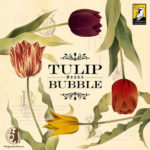 When I first played Tulip Bubble, I wasn’t as hot on it. The consensus was that it’s too much chaos to control, particularly when the bubble burst. But that’s the thing: it’s accurate to the theme and it’s what the game seeks to replicate. Players are attempting to turn a profit from three different colors of tulips during the tulip craze of 1637 (for an interesting nugget of financial history, look that up). But mechanically it does some really fun things, like when multiple people bid on a flower, those that bow out receive compensation if the bid exceeds market value. Tulip values climb and fall based on which flowers are bought and left on the market (along with some random events). Compared to a lot of other games on the list, it has some moments that make multiple players shout in agony, which I love.
When I first played Tulip Bubble, I wasn’t as hot on it. The consensus was that it’s too much chaos to control, particularly when the bubble burst. But that’s the thing: it’s accurate to the theme and it’s what the game seeks to replicate. Players are attempting to turn a profit from three different colors of tulips during the tulip craze of 1637 (for an interesting nugget of financial history, look that up). But mechanically it does some really fun things, like when multiple people bid on a flower, those that bow out receive compensation if the bid exceeds market value. Tulip values climb and fall based on which flowers are bought and left on the market (along with some random events). Compared to a lot of other games on the list, it has some moments that make multiple players shout in agony, which I love.
3-5 Players • Ages 12+ • 50-70 minutes • $36
2. Keyflower
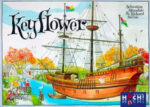 Of all the games on the list, this may be the most Euro of my choices. It’s the only one with the traditional meeples. There’s a bit of worker placement. It has an expansion centered around raising and breeding animals. You can’t get more Eurogame than that! But what Keyflower does with its auctions is fantastic in that it uses the different colors of meeples (red, blue, yellow, and the rare green) as different currencies in auctioning for tiles. Almost like a trick-taking game, if you want to bid on a tile or use a tile’s action, you have to follow suit, bidding with the same color that has already been used on it. For what it does with its auctions and entire conglomeration of mechanics, Keyflower is one of those essential medium-weight Euros.
Of all the games on the list, this may be the most Euro of my choices. It’s the only one with the traditional meeples. There’s a bit of worker placement. It has an expansion centered around raising and breeding animals. You can’t get more Eurogame than that! But what Keyflower does with its auctions is fantastic in that it uses the different colors of meeples (red, blue, yellow, and the rare green) as different currencies in auctioning for tiles. Almost like a trick-taking game, if you want to bid on a tile or use a tile’s action, you have to follow suit, bidding with the same color that has already been used on it. For what it does with its auctions and entire conglomeration of mechanics, Keyflower is one of those essential medium-weight Euros.
2-6 Players • Ages 12+ • 90-120 minutes • $65
1. Chicago Express
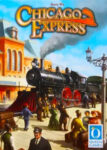 While I didn’t include 18xx on the list, Chicago Express is a close cousin. One of the most known of the cube rails series, Chicago Express is a stock buying train game. Each time an auction is triggered for a stock, players have to determine what a good bid is on it, and how many times the company will pay dividends to equate the amount spent. Sometimes an auction is triggered not for the revenue, but to get money in their treasury so they can put out more trains. It has many end-game parameters, but one is a set number of rounds. Each round is ended when two of the three action choices are exhausted with a selection system that uses gauges that you’d find on a train (auctions being one of them). It’s a game where you can leech off of other’s successes, destroy their progress by running a company dry, or go in the completely opposite direction and players do their own thing. It’s super satisfying and plays in under 90 minutes.
While I didn’t include 18xx on the list, Chicago Express is a close cousin. One of the most known of the cube rails series, Chicago Express is a stock buying train game. Each time an auction is triggered for a stock, players have to determine what a good bid is on it, and how many times the company will pay dividends to equate the amount spent. Sometimes an auction is triggered not for the revenue, but to get money in their treasury so they can put out more trains. It has many end-game parameters, but one is a set number of rounds. Each round is ended when two of the three action choices are exhausted with a selection system that uses gauges that you’d find on a train (auctions being one of them). It’s a game where you can leech off of other’s successes, destroy their progress by running a company dry, or go in the completely opposite direction and players do their own thing. It’s super satisfying and plays in under 90 minutes.
2-6 Players • Ages 12+ • 60 minutes • $55




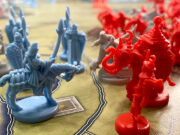


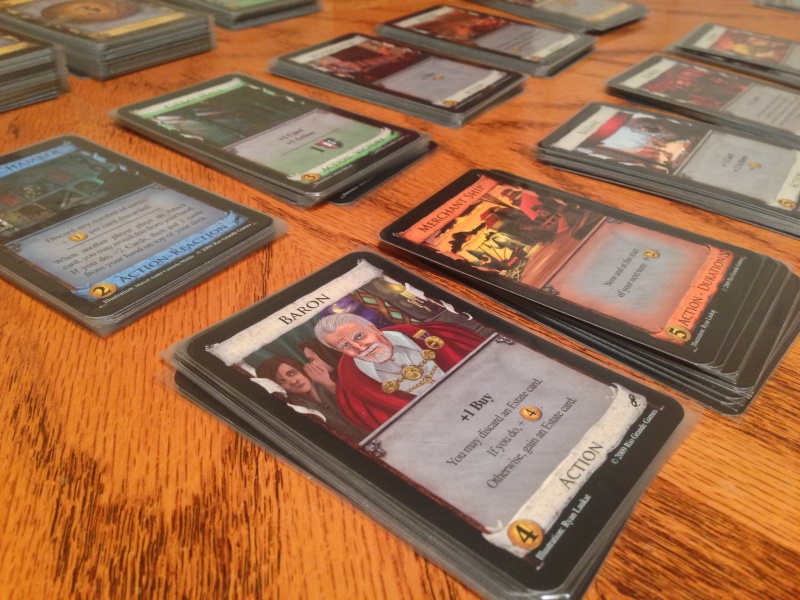
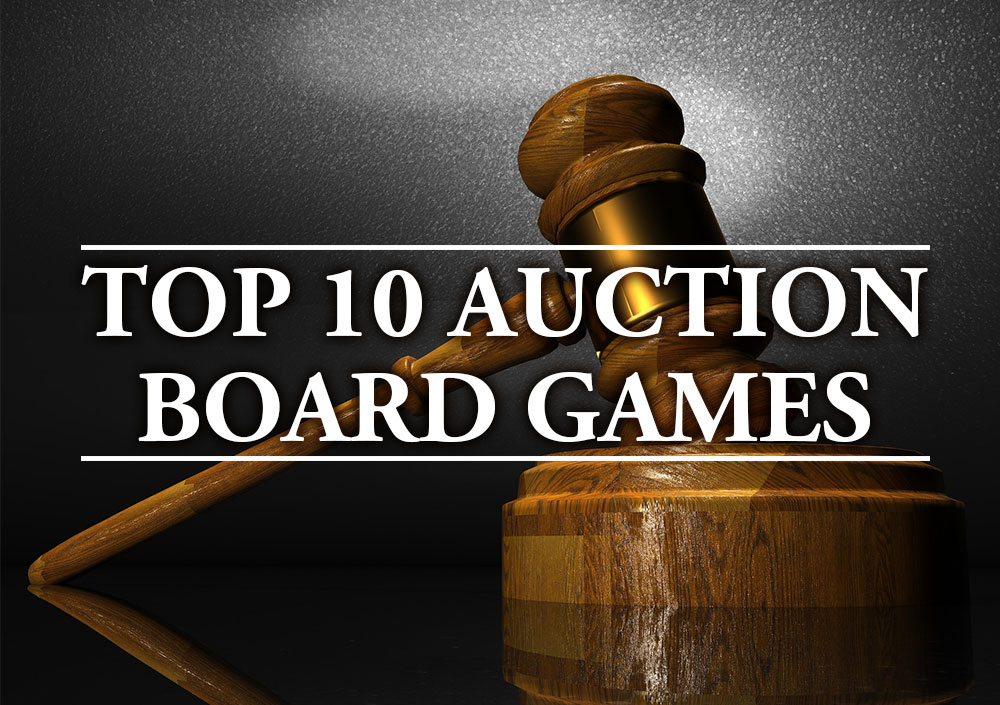

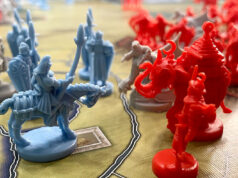












Reiner Knizia’s Ra is worth adding to this list.
Homesteaders?
RA!
Also, Medici.
Thanks for the tip on Chicago Express. I’ll check it out!
For Sale!
For Sale was my No. 12, just under the HIGHLY underrated Square on Sale.
I really love the auction mechanic in Cyclades, and it‘s really the core of the game.
How can one not mention Ra and Cyclades in such a list?
Finally getting a chance to reply to a comment! Ra is one that has evaded me, and I will make it my duty to play. As for Cyclades, I just didn’t think it was that good. I found the auction kinda dull and didn’t have the same emotional highs as Kemet or Inis.